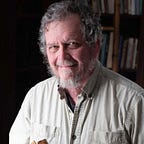The captain (Royal Navy retired) Part three of six A gay life in the first year of It’s a Sin.
There’s one other customer in “the semi-gay pub” that I have to mention, an elderly gentleman, friendly and personable, who was one of the most popular people in the “semi-gay pub.” James (his real name) was probably in his seventies, (He was probably straight. He sat his regular table not the gay corner) a white-haired retired Royal Navy captain with a big smile.
The captain had throat cancer. He was considered a bit of an English eccentric because he kept his own personal pint mug that he believed no one else should use — because he had throat cancer. “Cancer isn’t contagious” everyone said. I was filling up the captain’s pint mug one night and as I handed him the beer, James must have known I was curious. “You just have to be careful,” James said shaking his head. “You never know. You have to be responsible.” (or something like that).
In retrospect I am sure he was referring to his role as a captain in the Royal Navy who has the ultimate responsibility for the lives of his crew. He must have been in his late 70s or even early 80s, which means likely he had served in the Second World War. When James was at his usual table and when “Joseph” called “Time please,” signaling the pub was closing, he would drain his mug and then leave, giving everyone a friendly…
